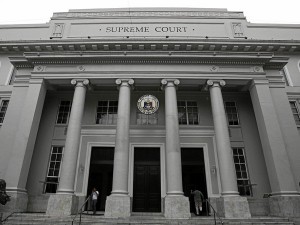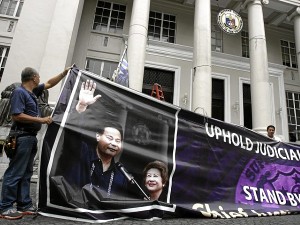Boost in foreign investor confidence seen after Corona conviction

The Supreme Court is one of the three coequal branches of the government. Its Chief Justice was found guilty of culpable violation of the Constitution by the Senate, which was formed as an impeachment court. PHOTO BY NIÑO JESUS ORBETA
The Senate, standing as an impeachment court, has spoken. The verdict on the highest magistrate of the land, on accusations that he willfully concealed substantial assets from his statement of assets, liabilities and net worth (SALN), is guilty, on a clear 20-3 vote.
Now that the five-month “Corona-vela” has come to its conclusion, will the effects ripple to the private sector, particularly in the real estate industry? Will foreign property investors now issue a positive verdict on the Philippines?
Inquirer Property asked the property experts. Here is their take:
Conviction as ‘medicine’
“The conviction is medicine for the property sector,” says Enrique Soriano, Ateneo program director for real estate and senior adviser for Wong+Bernstein Business Advisory. “The political exercise will define the context within which real estate businesses operate,” he adds.
Soriano says “for local property developers, it’s business as usual. The conviction of CJ Corona is a purely political exercise and will not in any way have any significant impact on the market. However, for foreign property investors, eyeing the Philippines as a viable alternative to channel investments, the conviction offers a welcome development and can result to more players taking a more aggressive position.”
David Leechiu, country head of Jones Lang LaSalle Leechiu, says “the decision is interpreted by many foreigners as the possible beginning of true, sustainable reform in the country. This is certainly a big win for the country and its leadership because it demonstrates its will to fight corruption at all levels.”
Leechiu adds that the trial would significantly benefit the property sector, “as a result of increased confidence in our laws and ability of the system to uphold property rights of owners. More confidence means more buyers and more volume of trade and values.”
Calvin Javiniar, senior director, CBRE Philippines Investments and Capital Markets, says “the conclusion of the impeachment trial of the Chief Justice positively affects the real estate industry since it re-strengthens the general confidence on the President.”
“Since winning the elections, there has always been pressure on the presidency to prove that it can deliver on its electoral promises, especially its seriousness to curb corruption in all government fronts. The political victory of the impeachment trial affirms that the President is in full political control and this translates to renewed investor confidence,” Javiniar says.
Stability vs political risks
Claro dG. Cordero Jr., head of research, consulting and valuation of Jones Lang LaSalle Leechiu, says “there are indeed positive effects, not just in the property/real estate sector, but in the aggregate economy in general, with the conclusion of the Corona trial.
“For one, this shows the world that we can complete a democratic process (complete with the verdict) and that political exercises like this should not hinder the growth of the economy. This is very important, if only to show the foreign investors wanting to put their money in the Philippines, that (economic) market forces that drive the econom ic/business environment are hardly disrupted despite the presence of these highly charged political activities,” Cordero says.
“We have laid a (business) environment for the foreign investors where stability (against political risks) is assured. This, I think, is the extreme importance of the just-concluded Corona trial. In the property sector, we did not hear any foreign investors who have backed out from their respective deals before, during and after the trial,” Cordero says.
He adds: “With this major development, we can see a much more stable stream of investments, both foreign and local, pouring into the property sector, regardless of whether there are any nonviolent political event unfolding. This stability and steady flow of investment are what we need to further the development of the property sector.”
Trust rating as a nation
Liz Silvestre, associate director, CBRE Investments & Capital Markets, says: “(The trial and verdict) have posed a great positive impact in terms of the current real estate investment positioning of our country as a sound real estate investment destination (more than just having pristine white sand beaches, majestic islands and home to Manny Pacquiao). This historical milestone rests on the foundation of the highest fundamental economic factor considerations. More specifically, our overall trust rating as a nation, confidence in the legal due process system and the institution it represents. Moreover, competence in the implementation of the law more than just a political will.”
Silvestre adds that having a strong presence of steady balance of positive economic technical, political and fundamental indicators, capital markets will remain active, if not consistent, on its uptrend. The emergence of the niche-oriented real estate options versus traditional investment instruments will continue to gain more traction as it potentially claims the biggest pie in the high-end segment market share.
Vixen Salvador, director, CBRE Global Research and Consultancy, says “one of the positive effects of the entire impeachment trial, regardless of an acquittal or conviction, is that we’ve shown the world that democratic institutions and processes in the Philippines still work and can settle issues without having to go to the streets every time one side feels disadvantaged.”
Lessons from Indonesia
Leechiu says many of the foreigners here have said that they’ve been wanting to buy property but do not trust the courts to be fair should there be a problem later in the investment. He stresses that “this step of the conviction will be encouraging for them to invest, in the same way that Indonesia fought corruption painfully and now they are benefiting from those efforts.”
Cordero says “the fight against corruption by the government will surely boost the level of confidence of the investors into our institutions. I hope the conclusion of the impeachment trial will send a very strong and clear signal to investors that corruption will not be tolerated anymore.
“If one would conduct a quick survey among investors, the level of transparency and accountability is their foremost concern, and we hope that the government is indeed serious to take away the corruption not just at the top level, but most importantly, at the grass roots level.”
Cordero stresses that “In order for them (real estate investors, both foreign and local) to invest in a market, the degree of transparency (as shown by the free flow of information and consistent application of local property laws) needs to be acceptable to them. And the fight against corruption should come in perfect play, because the common perception among investors is that corruption breeds in the grassroots level that hinders the free flow of information and consistent application of local property laws.”
He explains that regulatory factors (application of real estate taxes, planning and building codes, enforceability of contracts), land and property registration (availability, completeness and integrity of land registry records), eminent domain, ease of transaction process, presence of credible real estate debt market, availability of credible facilities and property management and availability of fair, credible and independent property valuation practices are just some of the factors that make a specific market transparent and level the field for all enterprising investors.
“As the government gears up for a serious fight against corruption, we shall expect an improvement of the following factors in the local investment market, which will entice more investors to put their money in the property sector,” Cordero adds.
No lip service
Soriano said that the conclusion of CJ’s trial has the following benefits (in terms of the country’s image):
• Good governance in the Aquino administration will no longer be lip service.
• The role of government is to regulate and the conviction will spur more confidence in the areas of good governance and fair practices.
“It also sends a strong message to the real estate community that the Aquino administration is determined to cleanse the bureaucracy of misfits and corrupt government officials from the national office, housing related institutions all the way to the local government units without fear or favor,” said Soriano.
Javiniar said: “Confidence in government and its institutions is a very important factor in attracting investments, particularly foreign investments. Right now we are experiencing a very robust real estate market capped by healthy economy and strengthening local purchasing power. As such, foreign companies, multinationals, foreign investors and international fund managers are looking very closely at the country to bring in capital.
“The conclusion of the trial sends a message that the government is very keen in promoting a peaceful, corruption-free, investment environment which will be beneficial to those who want to do business in the country.”
Regardless of political noise
Salvador said that “investor anxieties may somehow be lessened by this recent showing of democratic maturity. However, as we’ve experienced in the last few years, the Philippine economy has long been relatively shielded from political events since the fundamental drivers of the Philippine economy, and of the real estate industry, has thrived and progressed regardless of any political noise. These drivers include business process outsourcing firms (BPOs), overseas Filipino workers (OFW) remittances, tourism, direct and portfolio investments. The upshot is positive but may prove to be minimal.
Word of caution
Soriano, however, issues a word of caution: “House cleaning is not enough. To further boost investor confidence and fuel economic growth, economic policies related to the REIT (Real Estate Investment Trust) market and other investor-friendly real estate initiatives must now be put forward.”
Soriano added that “in the investing community, every day is like an election day. If the host country cannot provide opportunities for a reasonable return, investors will vote with their feet and run to the next country that offers better payback.”
